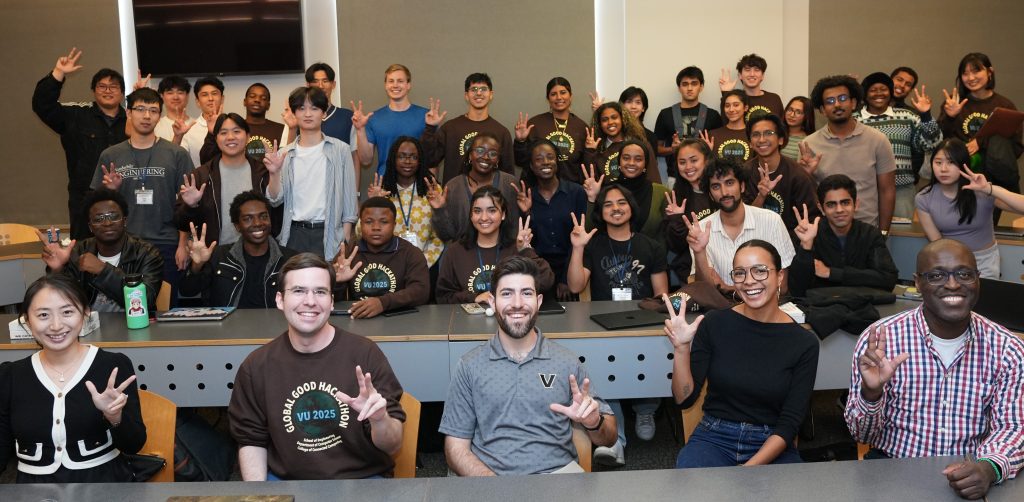
With a focus on broadening innovation and empowering talent across disciplines, Vanderbilt’s inaugural “Global Good” hackathon sought to address real-world issues, from social justice and education equity to climate change and environmental sustainability.
The event, held on Vanderbilt’s campus April 12-13, was sponsored by the Department of Computer Science and the university’s new College of Connected Computing. Support for the hackathon was made possible by Antonio Akins, BS’96, senior vice president of engineering at Salesforce.
Akins attended the hackathon as a guest judge and was joined by fellow Vanderbilt computer science alumni and guest judges, Ariana Fowler, BS’17, and Benjamin Sklar, BS’18. In addition to final judging, the alumni volunteered their time for much of the two full days interacting with students and coaching the teams as they worked on their projects.
The hackathon was designed to empower students from diverse backgrounds, bringing together members of organizations like the National Society of Black Engineers, ColorStack, and Women in Computing. More than 50 students from across Vanderbilt and Fisk University participated in the weekend event.
The grand prize winner was goMigo, a project that makes public transit more accessible for those who don’t know the local language; the Social Impact Award went to Nodify, a peer-to-peer messaging application that enables people to communicate during crises or natural disasters when regular network service may not be available; and the Technical Achievement Award winner was AI-ttorney, an application that helps public defenders quickly conduct legal research to help them perform better—and ultimately, to level the playing field in courts of law.
“Throughout my career, I’ve seen how hackathons like this spark innovative new technology solutions as well as new networking and resume building opportunities for participants,” Akins said. “It was great to see how the Vanderbilt community of faculty, staff, students, and alumni collaborated to make this possible.”
Akins reached out to Vanderbilt about hosting a hackathon after seeing similar ones at Salesforce and other large tech companies that engaged a broad range of engineers—from computer science and beyond—to help solve pressing societal problems.
“I’d already been thinking about something like this, so when I began talking to Antonio all the pieces fell into place,” said Jonathan Sprinkle, professor of computer science and chair of the department. “I’m grateful for the alumni support and enthusiasm that made this first hackathon such a success. I look forward to growing this annual event into something truly special.”
Hackathon organizers included Meiyi Ma, assistant professor of computer science, and David Hyde, assistant professor of computer science and engineering management. They said they are already planning for next year.
“Because of the success of this year’s Global Good Hackathon, we’re looking forward to next year and possibly even more participants,” Ma said. “We’re grateful to Antonio Akins for his support, and desire to broaden innovation and empower students from diverse backgrounds to be successful in their chosen fields.”
Student leaders who helped run the hackathon included Vanderbilt senior Mahlet Derege, from the National Society of Black Engineers; senior Shalini Thinakaran, with ColorStack; and junior Katelyn Gildersleeve from Women in Computing.